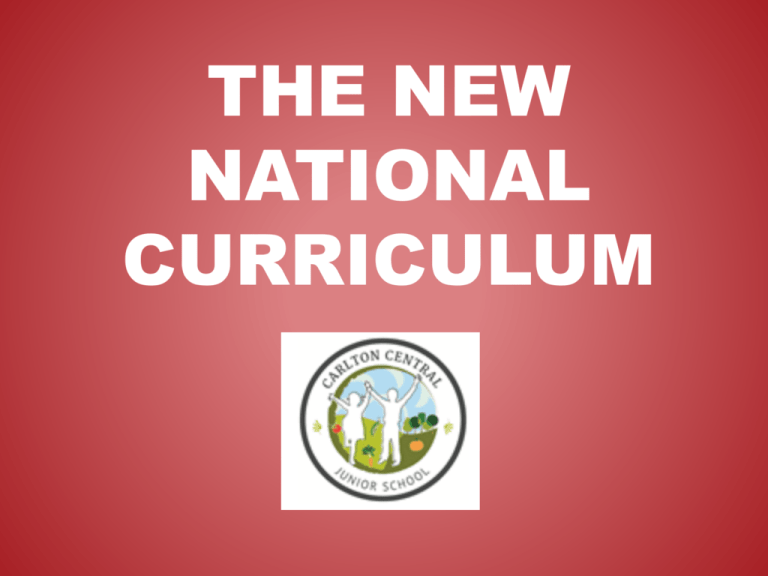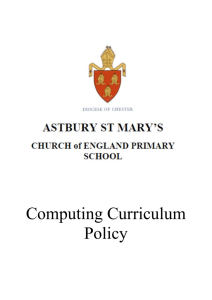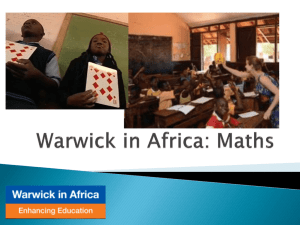New National Curriculum - Carlton Central Junior School
advertisement

THE NEW NATIONAL CURRICULUM National Curriculum •Core subjects: –English, Maths, Science –Set out year-by-year, or in two-year cycles •Foundation subjects: –Art, Computing, Design & Technology, Geography, History, Music, PE and Foreign Languages –Often taught in cross-curricular themes, or blocks across the year The Carlton Central Curriculum Made up of the National Curriculum and… •Religious Education •Personal, Social & Health Education •Citizenship & ‘British Values’ •Carlton Central Values •School trips & residential visits •Sportsmanship •Performing and Singing National Curriculum Changes Significant changes overall: •Higher expectations in core subjects •More focus on traditional ‘knowledge’ •Much more vocabulary •Clear year-by-year goals Changes to English Reading • A focus on positive attitudes and reading for pleasure • Reading is treated as two interlinked elements – word reading and comprehension • Read a broad range of authors and text types • Reciting poetry by heart • A greater emphasis of word meaning and language development Changes to English Writing The writing process is broken down into a number of steps: Planning Drafting and Writing Evaluating and Editing Proof-Reading Reading Aloud and Sharing This process of planning-writing-improvingsharing helps children to make sure they shape their words to match their intended purpose and audience. Changes to English There is more grammatical terminology, e.g. By Year 2 noun adjective verb adverb tense apostrophe By Year 4 preposition conjunction clause determiner adverbial pronoun By Year 6 modal verb relative clause subject & object active & passive synonym & antonym past progressive tense Spelling Expectation Year Group Example Spellings Year 1 miss, bank, rabbit, have, kitchen, made Year 2 badge, change, flies, happiest, enjoyment Year 4 forgotten, preferred, mystery, trouble, immature, anti-clockwise, treasure, poisonous Year 6 ambitious, official, innocent, changeable, deceive, solemn, stationery / stationary (including knowing difference) Spoken Language There is a focus on vocabulary development and the importance of spoken language not just in English, but also across the wider curriculum. Spoken language is presented not just as an aspect of one subject, but it is also the medium through which children explore ideas and ultimately learn. Changes to Maths • Focus on traditional written methods • Much higher challenge on fractions • Emphasis on learning number facts • Larger numbers are encountered earlier • Tables to 12x12 by the end of Year 4 • Focus on problem solving • Roman numerals have been introduced in the Year 3 curriculum • No probability • No use of calculators until the end of KS2 Changes to Maths There is a higher expectation overall. By Year 2 By Year 4 Number bonds to 20 Know all tables to 12x12 2x, 5x and 10x tables Know metric conversions Count in 2s, 3s and 5s Count in 6s, 7s and 9s Write numbers to 100 in words and Count backwards, digits including negatives By Year 6 Know prime numbers to 20 Name parts of a circle Recognise equivalent fractions, decimals and percentages Written Methods Written Methods Science • • • • • Continued emphasis on working scientifically Increased emphasis on terminology and vocabulary Includes history of Science and notable Scientists Evolution in Y6 Human life cycle now included Computing Main Changes •Used to be ICT •Bigger focus on e-Safety •More emphasis on programming History Pupils should be taught: • to know and understand the history of Britain as a coherent narrative from the earliest times to the present day. • to know and understand significant aspects of the history of the wider world. • to understand historical concepts. • to understand the methods of historical enquiry. History Year 3/4 Year 5/6 • The Stone Age to the Iron Age • Ancient Egypt • Anglo-Saxons & Vikings • Mayan Civilization • • • • Ancient Greece Roman Britain The Victorians A local study - Impact of WWII Geography • A greater focus on the UK • Locational knowledge: the world’s countries • Locational and place knowledge of Europe [including Russia] and the Americas • Position and significance of latitude, longitude, Equator • Key aspects of physical and human geography [includes settlement, rivers, the water cycle] • Compass directions, use of OS map conventions. • Greater emphasis on fieldwork PE Pupils should be taught to: • use running, jumping, throwing and catching in isolation and in combination • play competitive games • develop flexibility, strength, technique, control and balance • perform dances using a range of movement patterns • take part in outdoor and adventurous activity challenges both individually and within a team • swim competently, confidently and proficiently over a distance of at least 25 metres • use a range of strokes effectively • perform safe self-rescue in different water-based situations MFL • • • • French (Upper School) Spanish (Lower School) Now statutory in KS2 Focuses on four skills; Speaking, Listening, Reading and Writing. By Year 6 children should be able to: greet and respond to name; describe family, pets, hobbies and school life; know different colours, days of week and months of year, names of food; describe the weather and count up to 100. Art Pupils should be taught: • to create sketch books to record their observations and use them to review and revisit ideas • to improve their mastery of art and design techniques, including drawing, painting and sculpture with a range of materials [for example, pencil, charcoal, paint, clay] • about great artists, architects and designers in history DT Designing and Making Children will continue to: • design and make products using a range of materials, including textiles, construction materials and food • create mechanical products and electrical products • investigate and analyse existing products, as well as evaluating their own ideas and products Cooking and Nutrition Children should have opportunities to learn how to prepare and cook dishes whilst also learning about nutrition and healthy eating. RE • The RE curriculum is split into 3 different strands: • Pupils will delve into a variety of religions, discover the underlying principles and learn how apply these principles to their own lives. • It is important that our pupils learn both tolerance and respect of different cultures and religions. This can only be achieved through a clear understanding of the beliefs of those around them. • Pupils will focus on both eastern and western religions throughout Key Stage 2. They will receive an overview of Christianity, Islam, Hinduism and Buddhism. Citizenship and British Values The DfE have recently reinforced the need “to create and enforce a clear and rigorous expectation on all schools to promote the fundamental British values of democracy, the rule of law, individual liberty and mutual respect and tolerance of those with different faiths and beliefs.” The Government set out its definition of British values in the 2011 Prevent Strategy, and these values have been reiterated in 2014. PSHE • PSHE is a non-statutory subject. • Schools can concentrate on the needs of their pupils. Music Pupils should be taught to: • • • • • • play and perform in solo and ensemble contexts, using their voices and playing musical instruments with increasing accuracy, fluency, control and expression improvise and compose music for a range of purposes using the inter-related dimensions of music listen with attention to detail, recall sounds with increasing aural memory and give their opinion use and understand staff and other musical notations appreciate and understand a wide range of high-quality live and recorded music drawn from different traditions and from great composers and musicians develop an understanding of the history of music







![afl_mat[1]](http://s2.studylib.net/store/data/005387843_1-8371eaaba182de7da429cb4369cd28fc-300x300.png)
